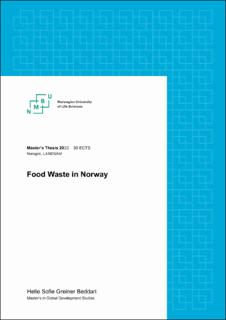| dc.description.abstract | Food waste being economically, environmentally and climatically, and ethically unsustainable has gained increasing momentum and is increasingly on the agenda, especially over the last years. This can be seen by measures set in motion globally as a part of the sustainable development goals, in the EU and at a national level in Norway.
With a qualitative study, this thesis will look into ongoing work on food waste reduction through Norway’s implementation of the SDG target 12.3 on halving food waste within 2030, as a measuring goal through the Voluntary Agreement on Food Waste Reduction and assessing if it has been sufficient enough. Currently, there is an ongoing process of drafting a food waste law where multiple parties discuss if a food waste law can be a better solution towards reaching the set goal by in increasing the paste and width of the work, as the findings of this study show that the voluntary agreement has not been satisfactory in reaching the 12.3 target. The law is not new to the discussion, but where some have preferred to keep the food reduction work voluntary while others believe that the food waste law is long overdue.
This study applies an integrative approach to transformation theory through three spheres, being the practical, political and personal spheres. Circular economy thinking will supply as a further tool of thinking towards sustainability. | |
